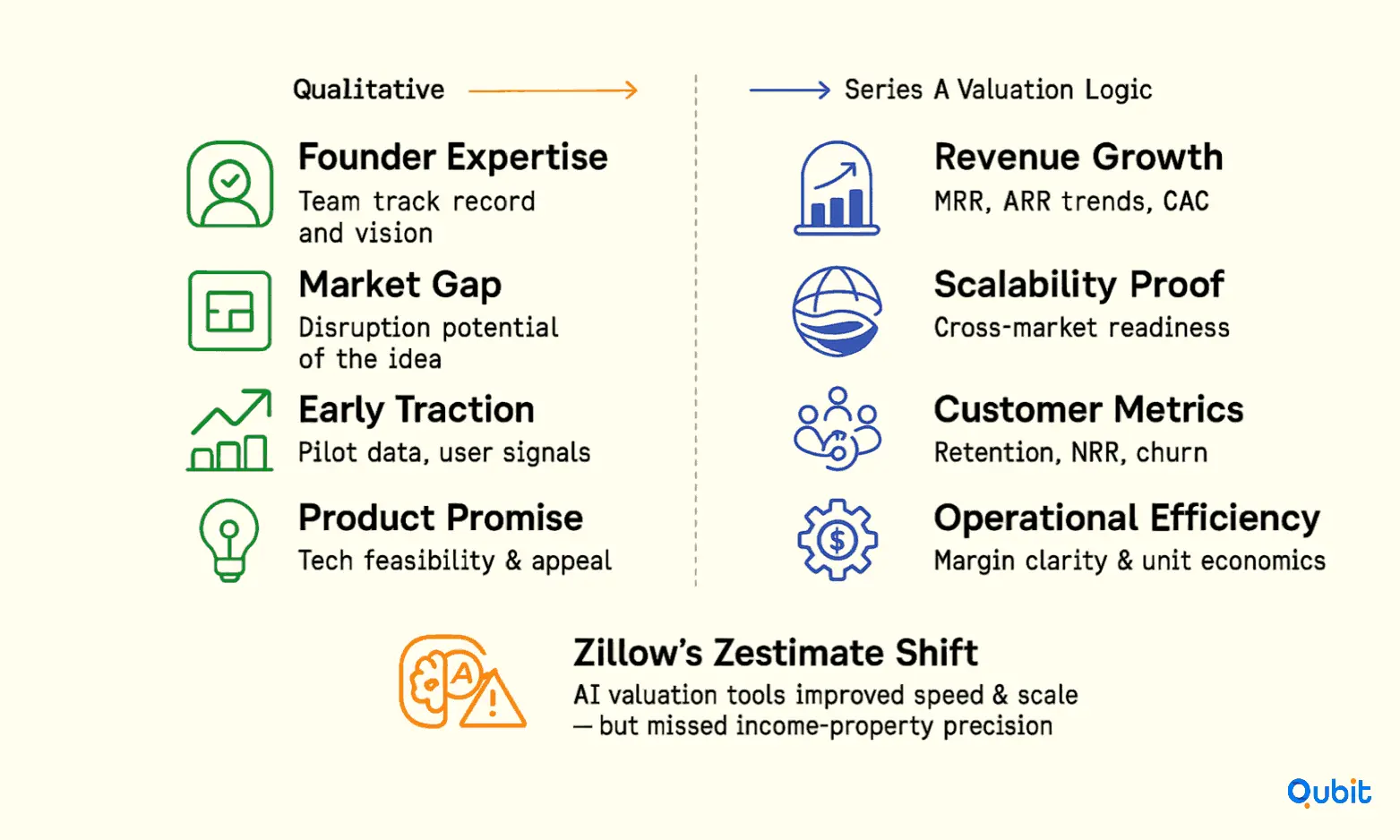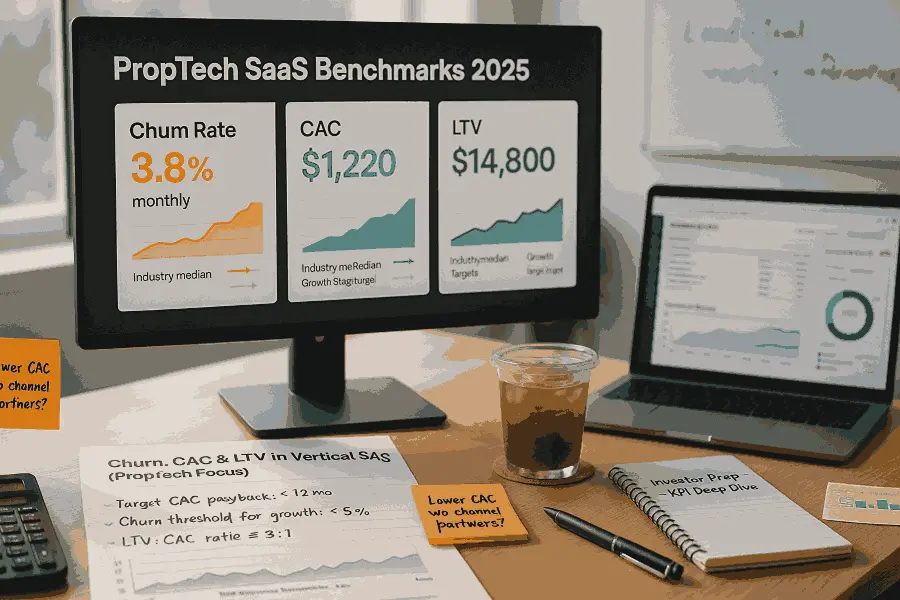Understanding how PropTech valuations evolve between Seed and Series A funding rounds is crucial for startups aiming to secure investment. These benchmarks not only reflect a company’s growth trajectory but also signal its market potential to investors.
This blog delves into the nuances of Seed vs Series A valuations, offering insights into the metrics, trends, and challenges that shape these critical funding stages. Your understanding of valuation benchmarks deepens within the context provided by the PropTech fundraising guide, which outlines the broader financing framework.
Whether you’re a founder preparing for your next pitch or an investor assessing opportunities, this guide will help you navigate the valuation landscape with confidence. Let’s explore the key differences and what they mean for PropTech startups.
Understanding PropTech Valuations
PropTech, short for Property Technology, represents the fusion of technology with real estate operations, revolutionizing how properties are bought, sold, managed, and analyzed. This innovative sector is reshaping traditional practices, offering smarter solutions for efficiency and transparency.
Valuations within the PropTech industry are influenced by several dynamic factors. Technological advancements, such as artificial intelligence and blockchain, play a pivotal role in determining a company's market worth. These innovations not only enhance operational capabilities but also create new revenue streams, making them attractive to investors. Additionally, market trends, including shifts in consumer behavior and the growing demand for sustainable solutions, further impact valuation metrics. Regulatory changes, such as data privacy laws and environmental standards, also contribute to shaping the financial outlook of PropTech ventures.
PropTech Valuation Benchmarks by Stage
Current market data reveals distinct valuation patterns across PropTech funding stages. Seed rounds average $2.1M pre-money valuations with median deal sizes of $850K, while Series A rounds require minimum $2.8M ARR and average $12.5M pre-money valuations.
| Funding Stage | Median Pre-Money | Median Deal Size | Typical Equity | ARR Requirement |
|---|---|---|---|---|
| Pre-Seed | $800K | $250K | 15-20% | $0-50K |
| Seed | $2.1M | $850K | 12-18% | $50K-500K |
| Series A | $12.5M | $4.2M | 15-25% | $2.8M+ |
| Series B | $45M | $12M | 12-20% | $8M+ |
Seed Stage Valuations in PropTech
Determining the valuation of a PropTech startup at the Seed stage is both an art and a science. With limited financial history to rely on, investors often focus on qualitative metrics like early traction, team strength, and the innovative potential of the product. These factors collectively shape the valuation landscape for early-stage companies.
Key Metrics for Seed Stage Valuations
At this stage, startups are primarily assessed on their ability to demonstrate early traction. This could include user adoption rates, pilot program results, or partnerships with key industry players. A strong founding team with relevant expertise and a clear vision also plays a pivotal role in building investor confidence. Additionally, the viability of the product—whether it addresses a significant market gap or introduces a disruptive solution—can significantly influence valuation.
Challenges in Valuing Early-Stage Startups
The absence of substantial financial data makes Seed stage valuations inherently challenging. Unlike later-stage companies, where revenue streams and profit margins provide concrete benchmarks, early-stage startups rely on projections and potential. This uncertainty often leads to a wide range of valuations, influenced by market sentiment, industry trends, and the perceived scalability of the business model.
Typical Valuation Ranges
Seed stage valuations in PropTech typically fall between $1 million and $5 million. However, exceptions exist for startups with groundbreaking technology or exceptional market potential, which can command higher valuations. These outliers often attract significant attention from investors eager to capitalize on early opportunities.
Series A Valuations in PropTech
The transition from Seed to Series A funding marks a pivotal moment for PropTech startups. At this stage, investors shift their focus from conceptual potential to measurable performance, emphasizing revenue traction and scalability. Series A valuations hinge on demonstrating operational growth and a proven market fit, setting the tone for long-term success.
Revenue Growth as a Core Metric
Unlike Seed funding, which often prioritizes innovative ideas and early-stage market validation, Series A funding demands tangible evidence of revenue growth. Startups must showcase consistent financial performance, highlighting their ability to generate income and sustain operations. This shift underscores the importance of growth metrics, such as monthly recurring revenue (MRR) and annual recurring revenue (ARR), which serve as benchmarks for valuation.
Scalability and Operational Expansion
Scalability becomes a defining factor in Series A valuations. Investors seek assurance that a startup can expand its operations without compromising efficiency or profitability. PropTech companies must demonstrate their ability to scale across markets, adapt to varying customer needs, and maintain robust infrastructure to support growth. This operational readiness often distinguishes Series A candidates from their Seed-stage counterparts.
Evolving Investor Sentiment
Investor sentiment evolves significantly during Series A funding rounds. While Seed investors often exhibit higher risk tolerance, Series A investors demand a balanced approach to risk and reward. They prioritize startups with a clear path to profitability, backed by data-driven insights and strategic planning. Comparative analysis of valuation metrics aligns with insights from the PropTech VC directory 2025, linking investor trends with funding benchmarks.
Contrasting Seed and Series A Requirements
The leap from Seed to Series A funding involves a shift in priorities. Seed-stage startups focus on proving their concept and securing initial traction, while Series A companies must demonstrate operational scaling and market fit. This progression highlights the need for robust business models, efficient processes, and a clear vision for growth.
Series A valuations in PropTech reflect a dynamic interplay of revenue growth, scalability, and investor expectations. By meeting these criteria, startups can secure the funding necessary to drive innovation and expand their market presence.
Market Dynamics and Trends in PropTech Valuations
PropTech valuations are shaped by a complex interplay of technological advancements, economic conditions, and regional factors. As artificial intelligence (AI), the Internet of Things (IoT), and Big Data redefine traditional valuation methods, they enable more precise forecasting and risk assessment. These technologies are not only transforming how companies are valued but also driving innovation across the sector.
Economic and regulatory shifts further influence PropTech trends, acting as both catalysts and challenges. For instance, the projected 16% CAGR for the global PropTech market (2025–2034) highlights robust growth potential, with the market size expected to expand from $40.58 billion in 2024 to $179.03 billion by 2034. However, fluctuating interest rates and evolving real estate regulations can create hurdles, impacting investor confidence and valuation benchmarks.
Regional differences also play a pivotal role in shaping PropTech valuations. For example, the 7.4x median EV/Revenue multiple in Q4 2024 serves as a benchmark for public companies in the sector. Yet, these metrics can vary significantly depending on geographic factors such as market maturity and local demand. Observations on how geographic dynamics influence funding are complemented by the discussion in best regions for PropTech startups, reflecting regional variability in valuation approaches.
PropTech Subsector Multiple Variations
Different PropTech categories command distinct valuation multiples based on business model characteristics and market dynamics:
| PropTech Category | Revenue Multiple | Gross Margin | Market Preference |
|---|---|---|---|
| Property Management SaaS | 8-12x | 75-85% | High predictability |
| Construction Tech | 6-9x | 60-70% | Project-based volatility |
| Real Estate Marketplaces | 10-15x | 15-25% | Network effects premium |
| PropTech Fintech | 7-11x | 65-75% | Regulatory complexity discount |
Public vs. Private Market Correlation
Public PropTech companies average 7.4x EV/Revenue, creating pricing anchors for private markets. Private companies typically trade at 15-25% premium to public comparables due to growth expectations and illiquidity compensation.
Comparative Analysis and Challenges in PropTech Valuations
Valuation drivers in PropTech evolve significantly between Seed and Series A funding stages, reflecting distinct priorities and methodologies. Seed-stage valuations often emphasize qualitative factors, such as the founding team’s expertise and the product’s potential to disrupt the market. In contrast, Series A valuations shift toward quantitative metrics like revenue growth, customer acquisition costs, and market share. This transition underscores the increasing demand for measurable performance indicators as startups mature.

Case studies provide valuable insights into these differences. For instance, Zillow’s implementation of an AI-driven Zestimate algorithm demonstrates how emerging technologies can enhance valuation accuracy. Traditional appraisal methods struggled to adapt to dynamic market conditions, but AI reduced computation time and improved precision. However, automated systems are not without limitations. Zillow’s algorithms underestimated values for income-producing multifamily properties, highlighting the need for specialized expertise in certain asset classes.
Economic trends also play a pivotal role in shaping investor sentiment. During downturns, investors may prioritize profitability and risk mitigation over aggressive growth projections, impacting valuations across both funding stages. Conversely, advancements in PropTech, such as AI and blockchain, can boost investor confidence by showcasing scalability and innovation.
Macro-level industry observations reinforce specific funding assessments as detailed in PropTech investment trends 2025, offering you an expansive view of valuation dynamics.
Understanding these nuances is essential for startups aiming to secure funding while addressing valuation challenges. By aligning qualitative and quantitative metrics with market expectations, PropTech companies can navigate the complexities of evolving investor priorities.
Tools and Resources for Valuation Benchmarking
Accurate valuation benchmarking relies on a combination of advanced technologies, detailed industry insights, and professional expertise. To streamline this process, businesses can utilize a variety of tools and resources tailored to meet their specific needs.
AI-Driven Platforms for Precision
Artificial intelligence has revolutionized valuation benchmarking by automating complex calculations and providing real-time analytics. Platforms like machine learning-based valuation tools offer predictive modeling and scenario analysis, enabling businesses to make data-driven decisions with greater confidence. These tools simplify the process of comparing financial metrics across industries, saving time while enhancing accuracy.
Specialized Databases and Industry Reports
Access to comprehensive databases and industry reports is essential for reliable benchmarking. Resources such as market-specific financial databases provide detailed metrics, including historical trends and peer comparisons. These insights help businesses understand industry standards and identify gaps in their valuation strategies.
Expert Consulting Services
While technology plays a pivotal role, expert consultations remain invaluable for bridging traditional valuation methods with modern tools. Financial consultants bring years of experience and nuanced understanding, ensuring that businesses can interpret data effectively and align their strategies with market expectations.
Economic Sensitivity and Risk Assessment Framework
Interest Rate Impact Analysis
PropTech companies show varying sensitivity to economic conditions:
- High sensitivity (50%+ revenue correlation): Real estate fintech, mortgage tech
- Medium sensitivity (25-40% correlation): Property marketplaces, investment platforms
- Low sensitivity (10-20% correlation): Property management SaaS, maintenance tech
Regulatory Risk Assessment
PropTech faces unique regulatory challenges that affect valuations:
- Compliance costs: 10-15% of revenue for multi-state operations
- Licensing requirements: $50K-200K annual regulatory expenses
- Data privacy obligations: GDPR/CCPA compliance adding $75K-150K costs
Post-Investment Performance and Success Metrics
Valuation Impact on Success Rates
Companies funded at higher valuations show different performance patterns:
| Entry Valuation | Follow-on Success Rate | Median Exit Multiple | Time to Exit |
|---|---|---|---|
| Below median | 78% | 4.2x | 5.1 years |
| At median | 65% | 3.1x | 4.8 years |
| Above median | 52% | 2.3x | 6.2 years |
Value Creation Between Rounds
Successful PropTech companies achieve valuation uplift through specific improvements:
- Market expansion: Geographic scaling increases valuations 2-3x
- Product diversification: Additional revenue streams add 25-40% premium
- Strategic partnerships: Enterprise relationships boost valuations 15-25%
- Regulatory achievements: Licensing completion removes 20-30% risk discount
Long-term Performance Correlation
Initial valuation discipline correlates with better outcomes: companies raising at conservative valuations show 35% higher success rates in subsequent rounds and 45% better exit multiples.
Conclusion
Establishing accurate valuation benchmarks is a critical step for startups and investors alike, especially when navigating the Seed and Series A funding stages. By focusing on data-driven analysis and staying attuned to market trends, both parties can make informed decisions that align with their growth objectives. These strategies not only help in setting realistic expectations but also foster transparency during negotiations.
For entrepreneurs, the key takeaway is to prioritize clarity and preparation. Investors, on the other hand, should emphasize due diligence and comparative analysis to identify promising opportunities. Whether you’re an entrepreneur aiming to attract the right backers or an investor seeking high-potential ventures, understanding valuation benchmarks ensures a solid foundation for long-term success.
Ready to take the next step? Discover how we can connect you with the right investors through our Investor Outreach service. Get in touch with us to transform your valuation challenges into growth opportunities.
Key Takeaways
- Benchmarking valuations in PropTech requires both qualitative and quantitative analysis.
- Seed stage valuations focus on early traction and team potential, while Series A emphasizes revenue growth and scalability.
- Market dynamics, regional differences, and emerging technologies significantly impact valuation benchmarks.
- Comparative analysis offers valuable insights into evolving investment trends and economic influences.
Frequently asked Questions
What are the key metrics for proptech valuation?
Key metrics include revenue multiples, user growth rates, and market traction indicators that provide insight into a startup’s potential.






